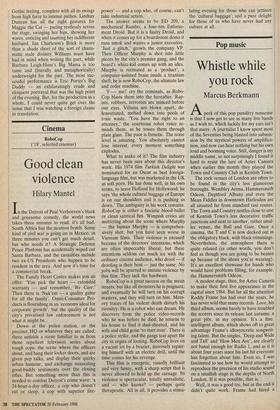Cinema
RoboCop (`18', selected cinemas)
Good clean violence
Hilary Mantel
In the Detroit of Paul Verhoeven's black and gruesome comedy, the world news takes three minutes to read: it's all bad. South Africa has the neutron bomb. Some kind of civil war is going on in Mexico; in three minutes you can't get much detail, but who needs it? A Strategic Defence Peace Platform has accidentally wiped out Santa Barbara, and the casualties include two ex-US Presidents who happen to be resident in the area. And now it's time for a commercial break.
The Family Heart Centre makes you an offer: 'You pick the heart — extended warranty — and remember, We Care.' Then there is `Nuk'em — a quality game for all the family'. Omni-Consumer Pro- ducts is flourishing in an 'economy ideal for corporate growth', but the quality of the city's privatised law enforcement is not what it might be.
Down at the police station, or the precinct HQ or whatever they are called, there unfolds a scene familiar to us from those repellent television series about tough cops: the scene where the officers shout, and bang their locker doors, and are given pep talks, and display their quirky urban humour, and exchange nauseating good-buddy sentiments over the closing titles. But something more than this is needed to combat Detroit's crime wave: 'a 24-hour-a-day officer, a cop who doesn't eat or sleep, a cop with superior fire- power' — and a cop who, of course, can't take industrial action.
The answer seems to be ED 209, a mechanical Rambo, a four-ton Enforce- ment Droid. But it is a faulty Droid, and when it comes up for a boardroom demo it runs amok and wastes a junior executive. `Just a glitch,' growls the company VP. Then Officer Murphy is shot into little pieces by the city's premier gang, and the board's whizz-kid comes up with an idea. Murphy is recreated as a 'product', a computer-assisted brain inside a titanium shell; he is now RoboCop, the ultimate law and order machine.
`F— me!' cry the criminals, as Robo- Cop blasts them into the hereafter. Rap- ists, robbers, terrorists are minced before our eyes. Villains are blown apart, de- fenestrated, melted down into pools of toxic waste. 'You have the right to an attorney,' the courteous robot voice re- minds them, as he tosses them through plate glass. The pace is frenetic. The noise level is amazing. You absolutely cannot lose interest; every moment something explodes.
What to make of it? The film industry has never been sure about this director's work. His 1974 film Turkish Delight was nominated for an Oscar as best foreign- language film, but was marketed in the UK as soft porn. He has done well, in his own terms, to leave Holland for Hollywood: he says 'the whole cultural baggage of Europe is on our shoulders and it is pushing us down.' The ambiguity in his work remains. RoboCop is either a fascistic blood-ballet or clean satirical fun. Wimpish critics are muttering about the scene where Murphy — the human Murphy — is comprehen- sively shot; but you have seen worse in Vietnam films. Their violence is excused because of the directors' intentions, which are often impeccably liberal; but these intentions seldom cut much ice with the ordinary cinema audience, who drool — if drooling is their bent — just the same. No yobs will be spurred to imitate violence by this film. They lack the hardware.
RoboCop is a great success on the mean streets, but like all monsters he is poignant; and eventually he will turn on his corrupt masters, and they will turn on him. Mem- ory traces of his violent death disturb his circuitry. He is a robot who can dream. He discovers from the police video-records who he was before he died; he returns to his house to find it dust-sheeted, and his wife and child gone 'to start over'. There is a police strike, and the gangs tear apart the city in orgies of looting. RoboCop lives on a vacant lot by a brazier, morosely repair- ing himself with an electric drill, until the time comes for his revenge.
This film is energetic, visually brilliant and very funny, with a sharp script that is never allowed to hold up the carnage. Its violence is spectacular, totally unrealistic, and — who knows? — perhaps quite therapeutic. All in all, it provides a stimu- lating evening for those who can jettison the 'cultural baggage'; and a pure delight for those of us who have never had any culture at all.


















































 Previous page
Previous page